外研版七年级下册英语Module12 Western music Unit 3 Language in use课件(30张PPT)
文档属性
| 名称 | 外研版七年级下册英语Module12 Western music Unit 3 Language in use课件(30张PPT) |

|
|
| 格式 | pptx | ||
| 文件大小 | 156.1KB | ||
| 资源类型 | 教案 | ||
| 版本资源 | 外研版 | ||
| 科目 | 英语 | ||
| 更新时间 | 2022-04-10 23:45:43 | ||
图片预览

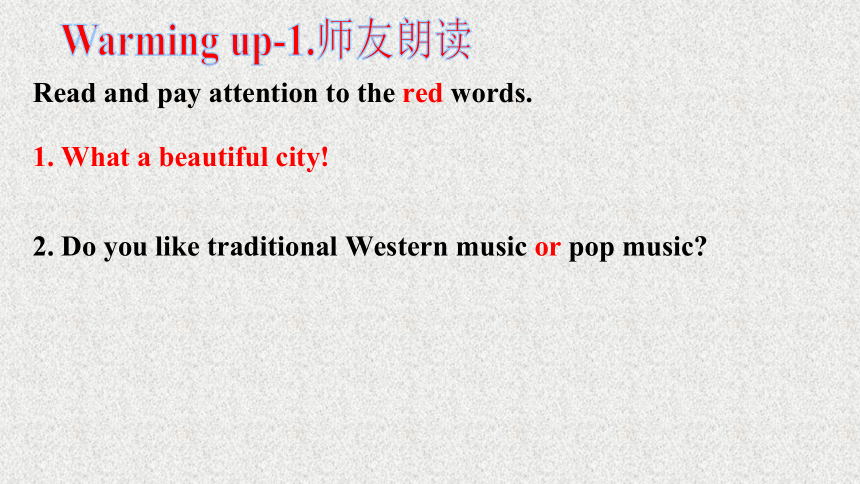

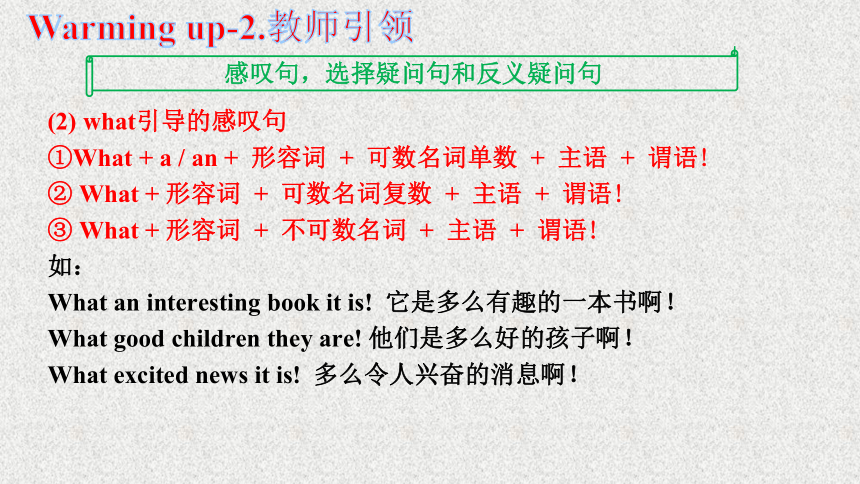
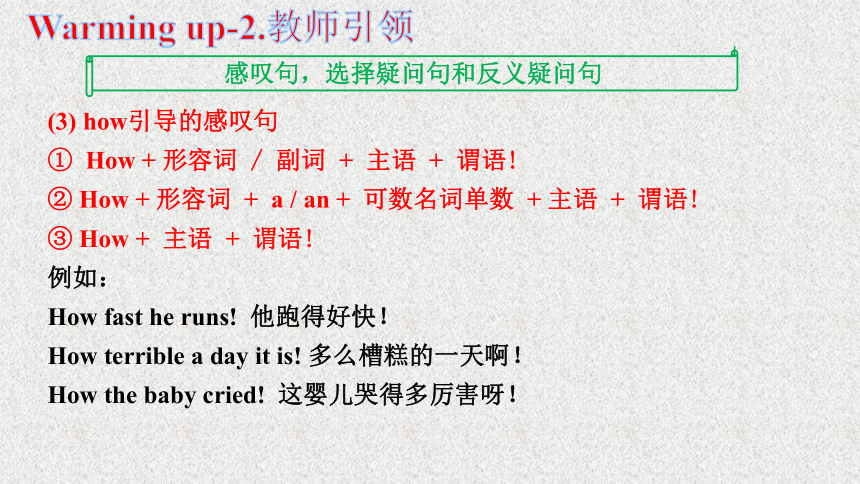
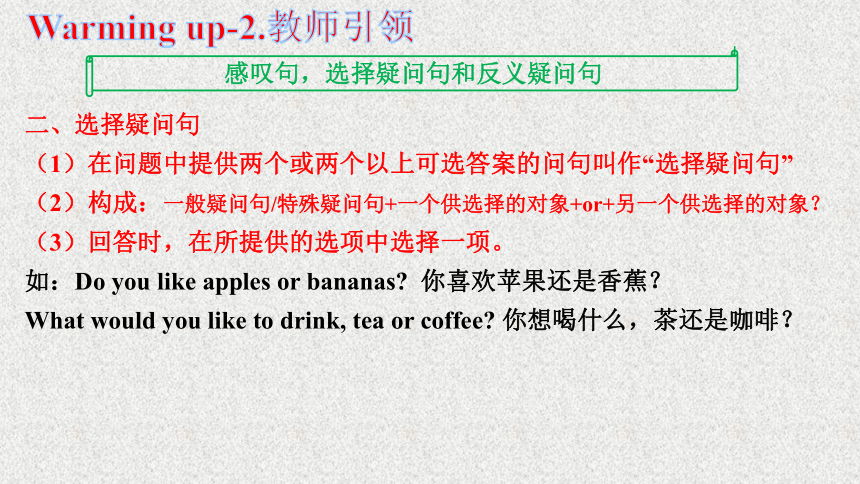
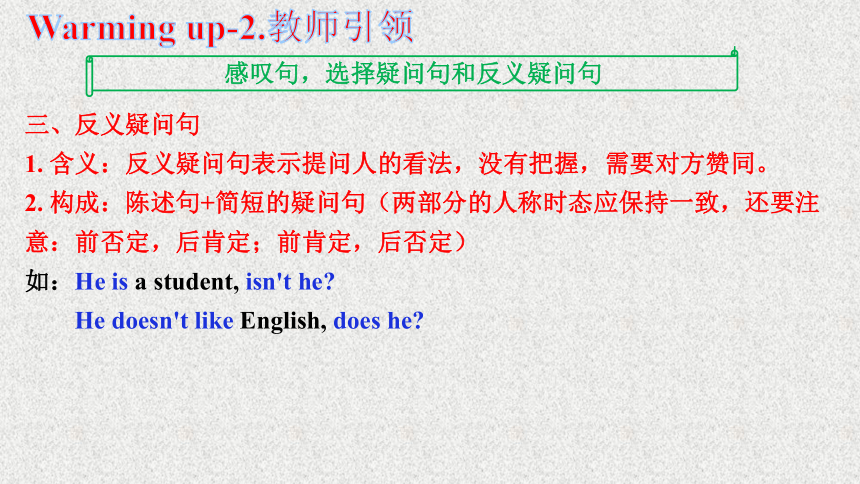
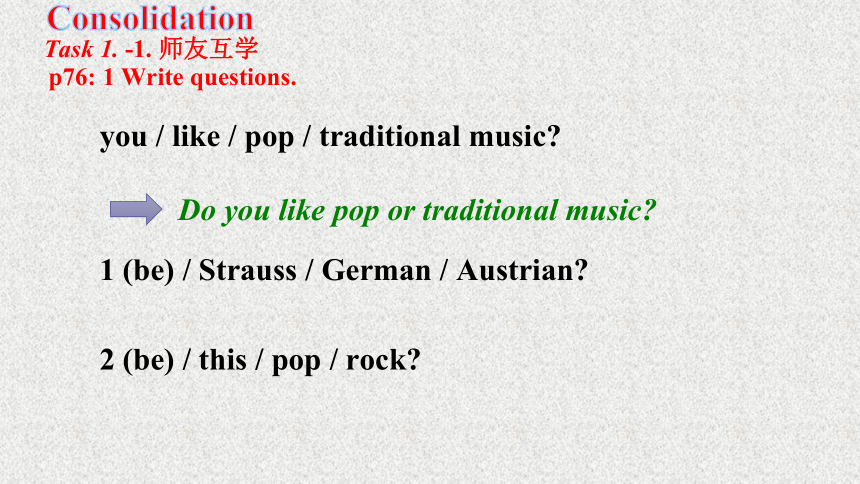

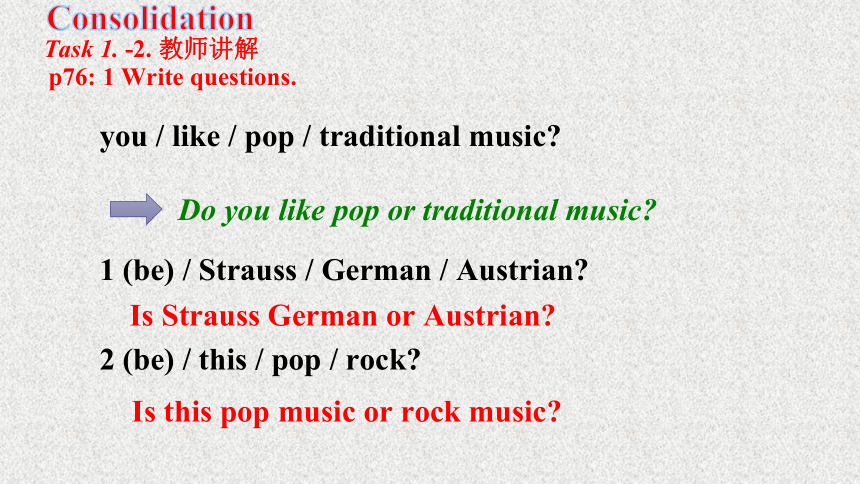
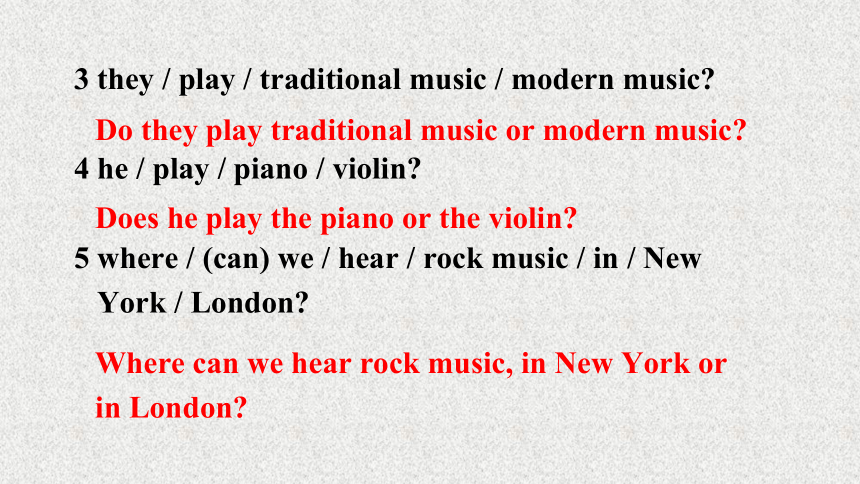
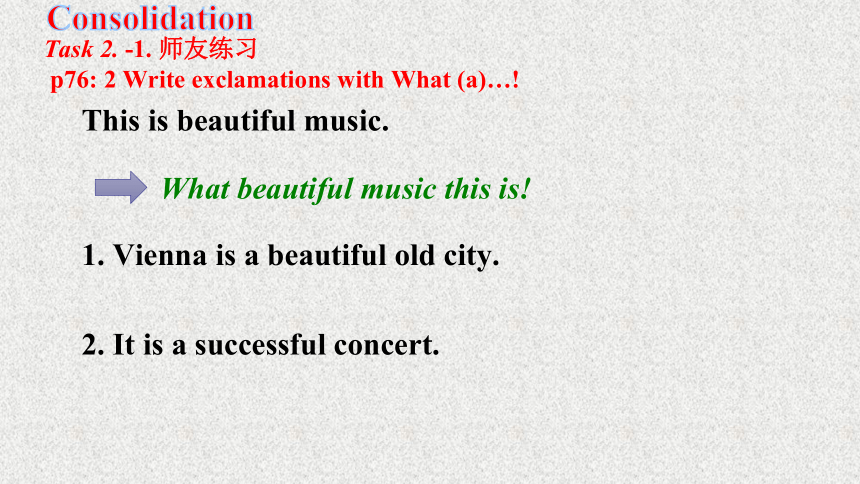
文档简介
(共30张PPT)
Module 12 Western music
Unit 3 Language in use
(Grammar)
Warming up-1.师友朗读
1. What a beautiful city!
2. Do you like traditional Western music or pop music
Read and pay attention to the red words.
感叹句,选择疑问句和反义疑问句
Warming up-2.教师引领
一、感叹句
1. 用法
感叹句表达一种较为强烈的感情,如喜悦、赞叹、惊异、愤怒、厌恶等。
2. 种类
(1) 在句式上和陈述句没什么区别,只是把句号变成感叹号。在口语中则是通过说话的语气来表达强烈的感情。
如:He is so happy! 他是如此高兴!
They are too tired! 他们太累了!
感叹句,选择疑问句和反义疑问句
Warming up-2.教师引领
(2) what引导的感叹句
①What + a / an + 形容词 + 可数名词单数 + 主语 + 谓语!
② What + 形容词 + 可数名词复数 + 主语 + 谓语!
③ What + 形容词 + 不可数名词 + 主语 + 谓语!
如:
What an interesting book it is! 它是多么有趣的一本书啊!
What good children they are! 他们是多么好的孩子啊!
What excited news it is! 多么令人兴奋的消息啊!
感叹句,选择疑问句和反义疑问句
Warming up-2.教师引领
(3) how引导的感叹句
① How + 形容词 / 副词 + 主语 + 谓语!
② How + 形容词 + a / an + 可数名词单数 + 主语 + 谓语!
③ How + 主语 + 谓语!
例如:
How fast he runs! 他跑得好快!
How terrible a day it is! 多么槽糕的一天啊!
How the baby cried! 这婴儿哭得多厉害呀!
感叹句,选择疑问句和反义疑问句
Warming up-2.教师引领
二、选择疑问句
(1)在问题中提供两个或两个以上可选答案的问句叫作“选择疑问句”
(2)构成:一般疑问句/特殊疑问句+一个供选择的对象+or+另一个供选择的对象?
(3)回答时,在所提供的选项中选择一项。
如:Do you like apples or bananas 你喜欢苹果还是香蕉?
What would you like to drink, tea or coffee 你想喝什么,茶还是咖啡?
感叹句,选择疑问句和反义疑问句
Warming up-2.教师引领
三、反义疑问句
1. 含义:反义疑问句表示提问人的看法,没有把握,需要对方赞同。
2. 构成:陈述句+简短的疑问句(两部分的人称时态应保持一致,还要注意:前否定,后肯定;前肯定,后否定)
如:He is a student, isn't he
He doesn't like English, does he
Consolidation
Task 1. -1. 师友互学
you / like / pop / traditional music
1 (be) / Strauss / German / Austrian
2 (be) / this / pop / rock
p76: 1 Write questions.
Do you like pop or traditional music
3 they / play / traditional music / modern music
4 he / play / piano / violin
5 where / (can) we / hear / rock music / in / New
York / London
Consolidation
Task 1. -2. 教师讲解
you / like / pop / traditional music
1 (be) / Strauss / German / Austrian
2 (be) / this / pop / rock
p76: 1 Write questions.
Is Strauss German or Austrian
Is this pop music or rock music
Do you like pop or traditional music
3 they / play / traditional music / modern music
4 he / play / piano / violin
5 where / (can) we / hear / rock music / in / New
York / London
Do they play traditional music or modern music
Does he play the piano or the violin
Where can we hear rock music, in New York or in London
This is beautiful music.
1. Vienna is a beautiful old city.
2. It is a successful concert.
p76: 2 Write exclamations with What (a)…!
What beautiful music this is!
Consolidation
Task 2. -1. 师友练习
3. They are playing noisy drums.
4. It was a wonderful party.
5. Mozart is a famous composer.
This is beautiful music.
1. Vienna is a beautiful old city.
2. It is a successful concert.
p76: 2 Write exclamations with What (a)…!
What a beautiful old city Vienna is!
What a successful concert it is!
What beautiful music this is!
Consolidation
Task 2. -2. 教师讲解
3. They are playing noisy drums.
4. It was a wonderful party.
5. Mozart is a famous composer.
What noisy drums they are playing!
What a wonderful party it was!
What a famous composer Mozart is!
Types of music Instruments People
p76: 3 Put the words and expression into the correct column.
drum fan musician piano pop
rock traditional music violin
Consolidation
Task 3. -1. 师友练习
Types of music Instruments People
p76: 3 Put the words and expression into the correct column.
pop
rock
traditional music
drum
piano
violin
fan
musician
drum fan musician piano pop
rock traditional music violin
Consolidation
Task 3. -2. 教师讲解
p77: 4 Complete the conversation with the correct form of the words
from the box.
Lingling: This is beautiful music. Who wrote it,
Betty
Betty: Beethoven wrote it. He was a great
musician. I (1) ______ his music.
Lingling: Me too. Did he live at the same time as
Mozart
come give hear learn love write
Consolidation
Task 4. -1. 师友练习
Betty: Yes, he was born in 1770 and began to
(2) ______ music at an early age. He
(3) ______ his first piano concert
when he was only seven.
Lingling: When did he start to (4) _____ music
Betty: Very early. His first work (5) ______
out before the age of thirteen.
Lingling: Was Beethoven famous at that time
Betty: Yes. But he began to lose his hearing.
In the last ten years of Beethoven’s
life, he (6) ______ nothing.
Lingling: That’s sad!
Betty: Yes, but he still played the piano. He
died when he was fifty-six.
p77: 4 Complete the conversation with the correct form of the words
from the box.
Lingling: This is beautiful music. Who wrote it,
Betty
Betty: Beethoven wrote it. He was a great
musician. I (1) ______ his music.
Lingling: Me too. Did he live at the same time as
Mozart
love
come give hear learn love write
Consolidation
Task 4. -2. 教师讲解
Betty: Yes, he was born in 1770 and began to
(2) ______ music at an early age. He
(3) ______ his first piano concert
when he was only seven.
Lingling: When did he start to (4) _____ music
Betty: Very early. His first work (5) ______
out before the age of thirteen.
came
write
gave
learn
Lingling: Was Beethoven famous at that time
Betty: Yes. But he began to lose his hearing.
In the last ten years of Beethoven’s
life, he (6) ______ nothing.
Lingling: That’s sad!
Betty: Yes, but he still played the piano. He
died when he was fifty-six.
heard
Around the world
Extension
Vienna New Year’s Concert
Every year, the Vienna New Year’s Concert takes place on 1st January. It is a classical music concert and it always includes pieces of music by the Strauss family. People all over the world watch it on TV and enjoy the music.
Summarize
感叹句,选择疑问句和反义疑问句
一、感叹句
1. 用法
感叹句表达一种较为强烈的感情,如喜悦、赞叹、惊异、愤怒、厌恶等。
2. 种类
(1) 在句式上和陈述句没什么区别,只是把句号变成感叹号。在口语中则是通过说话的语气来表达强烈的感情。
如:He is so happy! 他是如此高兴!
They are too tired! 他们太累了!
感叹句,选择疑问句和反义疑问句
(2) what引导的感叹句
①What + a / an + 形容词 + 可数名词单数 + 主语 + 谓语!
② What + 形容词 + 可数名词复数 + 主语 + 谓语!
③ What + 形容词 + 不可数名词 + 主语 + 谓语!
如:
What an interesting book it is! 它是多么有趣的一本书啊!
What good children they are! 他们是多么好的孩子啊!
What excited news it is! 多么令人兴奋的消息啊!
感叹句,选择疑问句和反义疑问句
(3) how引导的感叹句
① How + 形容词 / 副词 + 主语 + 谓语!
② How + 形容词 + a / an + 可数名词单数 + 主语 + 谓语!
③ How + 主语 + 谓语!
例如:
How fast he runs! 他跑得好快!
How terrible a day it is! 多么槽糕的一天啊!
How the baby cried! 这婴儿哭得多厉害呀!
感叹句,选择疑问句和反义疑问句
二、选择疑问句
(1)在问题中提供两个或两个以上可选答案的问句叫作“选择疑问句”
(2)构成:一般疑问句/特殊疑问句+一个供选择的对象+or+另一个供选择的对象?
(3)回答时,在所提供的选项中选择一项。
如:Do you like apples or bananas 你喜欢苹果还是香蕉?
What would you like to drink, tea or coffee 你想喝什么,茶还是咖啡?
感叹句,选择疑问句和反义疑问句
三、反义疑问句
1. 含义:反义疑问句表示提问人的看法,没有把握,需要对方赞同。
2. 构成:陈述句+简短的疑问句(两部分的人称时态应保持一致,还要注意:前否定,后肯定;前肯定,后否定)
如:He is a student, isn't he
He doesn't like English, does he
完成Revision module B练习题。
Homework
Module 12 Western music
Unit 3 Language in use
(Grammar)
Warming up-1.师友朗读
1. What a beautiful city!
2. Do you like traditional Western music or pop music
Read and pay attention to the red words.
感叹句,选择疑问句和反义疑问句
Warming up-2.教师引领
一、感叹句
1. 用法
感叹句表达一种较为强烈的感情,如喜悦、赞叹、惊异、愤怒、厌恶等。
2. 种类
(1) 在句式上和陈述句没什么区别,只是把句号变成感叹号。在口语中则是通过说话的语气来表达强烈的感情。
如:He is so happy! 他是如此高兴!
They are too tired! 他们太累了!
感叹句,选择疑问句和反义疑问句
Warming up-2.教师引领
(2) what引导的感叹句
①What + a / an + 形容词 + 可数名词单数 + 主语 + 谓语!
② What + 形容词 + 可数名词复数 + 主语 + 谓语!
③ What + 形容词 + 不可数名词 + 主语 + 谓语!
如:
What an interesting book it is! 它是多么有趣的一本书啊!
What good children they are! 他们是多么好的孩子啊!
What excited news it is! 多么令人兴奋的消息啊!
感叹句,选择疑问句和反义疑问句
Warming up-2.教师引领
(3) how引导的感叹句
① How + 形容词 / 副词 + 主语 + 谓语!
② How + 形容词 + a / an + 可数名词单数 + 主语 + 谓语!
③ How + 主语 + 谓语!
例如:
How fast he runs! 他跑得好快!
How terrible a day it is! 多么槽糕的一天啊!
How the baby cried! 这婴儿哭得多厉害呀!
感叹句,选择疑问句和反义疑问句
Warming up-2.教师引领
二、选择疑问句
(1)在问题中提供两个或两个以上可选答案的问句叫作“选择疑问句”
(2)构成:一般疑问句/特殊疑问句+一个供选择的对象+or+另一个供选择的对象?
(3)回答时,在所提供的选项中选择一项。
如:Do you like apples or bananas 你喜欢苹果还是香蕉?
What would you like to drink, tea or coffee 你想喝什么,茶还是咖啡?
感叹句,选择疑问句和反义疑问句
Warming up-2.教师引领
三、反义疑问句
1. 含义:反义疑问句表示提问人的看法,没有把握,需要对方赞同。
2. 构成:陈述句+简短的疑问句(两部分的人称时态应保持一致,还要注意:前否定,后肯定;前肯定,后否定)
如:He is a student, isn't he
He doesn't like English, does he
Consolidation
Task 1. -1. 师友互学
you / like / pop / traditional music
1 (be) / Strauss / German / Austrian
2 (be) / this / pop / rock
p76: 1 Write questions.
Do you like pop or traditional music
3 they / play / traditional music / modern music
4 he / play / piano / violin
5 where / (can) we / hear / rock music / in / New
York / London
Consolidation
Task 1. -2. 教师讲解
you / like / pop / traditional music
1 (be) / Strauss / German / Austrian
2 (be) / this / pop / rock
p76: 1 Write questions.
Is Strauss German or Austrian
Is this pop music or rock music
Do you like pop or traditional music
3 they / play / traditional music / modern music
4 he / play / piano / violin
5 where / (can) we / hear / rock music / in / New
York / London
Do they play traditional music or modern music
Does he play the piano or the violin
Where can we hear rock music, in New York or in London
This is beautiful music.
1. Vienna is a beautiful old city.
2. It is a successful concert.
p76: 2 Write exclamations with What (a)…!
What beautiful music this is!
Consolidation
Task 2. -1. 师友练习
3. They are playing noisy drums.
4. It was a wonderful party.
5. Mozart is a famous composer.
This is beautiful music.
1. Vienna is a beautiful old city.
2. It is a successful concert.
p76: 2 Write exclamations with What (a)…!
What a beautiful old city Vienna is!
What a successful concert it is!
What beautiful music this is!
Consolidation
Task 2. -2. 教师讲解
3. They are playing noisy drums.
4. It was a wonderful party.
5. Mozart is a famous composer.
What noisy drums they are playing!
What a wonderful party it was!
What a famous composer Mozart is!
Types of music Instruments People
p76: 3 Put the words and expression into the correct column.
drum fan musician piano pop
rock traditional music violin
Consolidation
Task 3. -1. 师友练习
Types of music Instruments People
p76: 3 Put the words and expression into the correct column.
pop
rock
traditional music
drum
piano
violin
fan
musician
drum fan musician piano pop
rock traditional music violin
Consolidation
Task 3. -2. 教师讲解
p77: 4 Complete the conversation with the correct form of the words
from the box.
Lingling: This is beautiful music. Who wrote it,
Betty
Betty: Beethoven wrote it. He was a great
musician. I (1) ______ his music.
Lingling: Me too. Did he live at the same time as
Mozart
come give hear learn love write
Consolidation
Task 4. -1. 师友练习
Betty: Yes, he was born in 1770 and began to
(2) ______ music at an early age. He
(3) ______ his first piano concert
when he was only seven.
Lingling: When did he start to (4) _____ music
Betty: Very early. His first work (5) ______
out before the age of thirteen.
Lingling: Was Beethoven famous at that time
Betty: Yes. But he began to lose his hearing.
In the last ten years of Beethoven’s
life, he (6) ______ nothing.
Lingling: That’s sad!
Betty: Yes, but he still played the piano. He
died when he was fifty-six.
p77: 4 Complete the conversation with the correct form of the words
from the box.
Lingling: This is beautiful music. Who wrote it,
Betty
Betty: Beethoven wrote it. He was a great
musician. I (1) ______ his music.
Lingling: Me too. Did he live at the same time as
Mozart
love
come give hear learn love write
Consolidation
Task 4. -2. 教师讲解
Betty: Yes, he was born in 1770 and began to
(2) ______ music at an early age. He
(3) ______ his first piano concert
when he was only seven.
Lingling: When did he start to (4) _____ music
Betty: Very early. His first work (5) ______
out before the age of thirteen.
came
write
gave
learn
Lingling: Was Beethoven famous at that time
Betty: Yes. But he began to lose his hearing.
In the last ten years of Beethoven’s
life, he (6) ______ nothing.
Lingling: That’s sad!
Betty: Yes, but he still played the piano. He
died when he was fifty-six.
heard
Around the world
Extension
Vienna New Year’s Concert
Every year, the Vienna New Year’s Concert takes place on 1st January. It is a classical music concert and it always includes pieces of music by the Strauss family. People all over the world watch it on TV and enjoy the music.
Summarize
感叹句,选择疑问句和反义疑问句
一、感叹句
1. 用法
感叹句表达一种较为强烈的感情,如喜悦、赞叹、惊异、愤怒、厌恶等。
2. 种类
(1) 在句式上和陈述句没什么区别,只是把句号变成感叹号。在口语中则是通过说话的语气来表达强烈的感情。
如:He is so happy! 他是如此高兴!
They are too tired! 他们太累了!
感叹句,选择疑问句和反义疑问句
(2) what引导的感叹句
①What + a / an + 形容词 + 可数名词单数 + 主语 + 谓语!
② What + 形容词 + 可数名词复数 + 主语 + 谓语!
③ What + 形容词 + 不可数名词 + 主语 + 谓语!
如:
What an interesting book it is! 它是多么有趣的一本书啊!
What good children they are! 他们是多么好的孩子啊!
What excited news it is! 多么令人兴奋的消息啊!
感叹句,选择疑问句和反义疑问句
(3) how引导的感叹句
① How + 形容词 / 副词 + 主语 + 谓语!
② How + 形容词 + a / an + 可数名词单数 + 主语 + 谓语!
③ How + 主语 + 谓语!
例如:
How fast he runs! 他跑得好快!
How terrible a day it is! 多么槽糕的一天啊!
How the baby cried! 这婴儿哭得多厉害呀!
感叹句,选择疑问句和反义疑问句
二、选择疑问句
(1)在问题中提供两个或两个以上可选答案的问句叫作“选择疑问句”
(2)构成:一般疑问句/特殊疑问句+一个供选择的对象+or+另一个供选择的对象?
(3)回答时,在所提供的选项中选择一项。
如:Do you like apples or bananas 你喜欢苹果还是香蕉?
What would you like to drink, tea or coffee 你想喝什么,茶还是咖啡?
感叹句,选择疑问句和反义疑问句
三、反义疑问句
1. 含义:反义疑问句表示提问人的看法,没有把握,需要对方赞同。
2. 构成:陈述句+简短的疑问句(两部分的人称时态应保持一致,还要注意:前否定,后肯定;前肯定,后否定)
如:He is a student, isn't he
He doesn't like English, does he
完成Revision module B练习题。
Homework
同课章节目录
- Module 1 Lost and found
- Unit 1 Whose bag is this?
- Unit 2 Are they yours?
- Unit 3 Language in use
- Module 2 What can you do ?
- Unit 1 I can play the piano
- Unit 2 I can run really fast
- Unit 3 Language in use
- Module 3 Making plans
- Unit 1 What are you going to do at the weekends?
- Unit 2 We're going to cheer the players.
- Unit 3 Language in use
- Module 4 Life in the future
- Unit 1 Everyone will study at home
- Unit 2 Every family will have a small plane.
- Unit 3 Language in use
- Module 5 Shopping
- Unit 1 What can I do for you?
- Unit 2 You can buy everything on the Internet
- Unit 3 Language in use
- Module 6 Around town
- Unit 1 Could you tell me how to get to the Nationa
- Unit 2 The London Eye is on your right.
- Unit 3 Language in use
- Revision module A
- Module 7 My past life
- Unit 1 I was born in a small village.
- Unit 2 I was born in Quincy.
- Unit 3 Language in use
- Module 8 Story time
- Unit 1 Once upon a time….
- Unit 2 Goldilocks hurried out of the house.
- Unit 3 Language in use
- Module 9 Life history
- Unit 1 He left school and began work at the age of
- Unit 2 He decided to be an actor.
- Unit 3 Language in use
- Module 10 A holiday journey
- Unit 1 What did you do?
- Unit 2 This morning we took a walk.
- Unit 3 Language in use
- Module 11 Body language
- Unit 1 They touch noses!
- Unit 2 Here are some ways to welcome them.
- Unit 3 Language in use
- Module 12 Western music
- Unit 1 It's so beautiful!
- Unit 2 Vienna is the centre of European classical
- Unit 3 Language in use
- Revision module B
